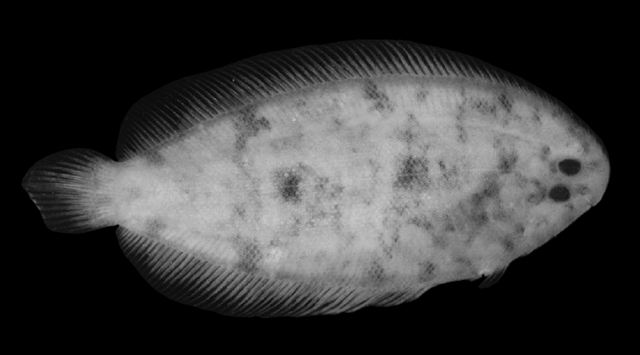| Soleidae (Soles) |
| 3.98 cm SL (male/unsexed) |
|
reef-associated; marine; depth range 3 - 18 m |
| Western Central Pacific: New Caledonia. |
|
Dorsal soft rays (total): 67-72; Anal soft rays: 51-53; Vertebrae: 36-36. Diagnosis: Dorsal rays 67-72; anal rays 51-53; dorsal rays branched except anterior 16-24 rays; anal rays branched. Lateral-line scales 71-76, including 7-8 anterior to a vertical at upper end of gill opening. Vertebrae 36; dorsal pterygiophores anterior to fourth neural spine 10. Body depth 2.45-2.5 in SL; head length (HL) 4.15-4.3 in SL; eye diameter 3.95-4.2 in HL upper eye overlapping about anterior one-third to one-half of lower eye; interorbital space narrow, the vertical distance separating eyes about one-third to one-sixth eye diameter. Caudal peduncle absent. Very fine cirri on ventral edge of head. Lateral line aligned with ventral edge of upper eye. Longest dorsal ray 1.4-1.45 in HL; caudal fin rounded, its length 3.9-3.95 in SL; pelvic fins 1.8-2.0 in HL; the tip of the longest ray reaching base of second or third anal ray. Ocular side in alcohol light yellowish brown with 3 rows of dark brown blotches, one row below base of dorsal fin, one above base of anal and pelvic fins, and one with two largest blotches well-spaced on lateral line; other brown markings mainly vertically elongate, some enclosing small irregular areas of ground color; fins pale yellowish except for faint dark blotches along base (Ref. 57560). |
| Collected from a steep slope of a fringing reef, with coral rock, rubble and sand at base (Ref. 57560). |
|
Data deficient (DD); Date assessed: 06 March 2015 Ref. (130435)
|
| harmless |
Source and more info: www.fishbase.org. For personal, classroom, and other internal use only. Not for publication.
